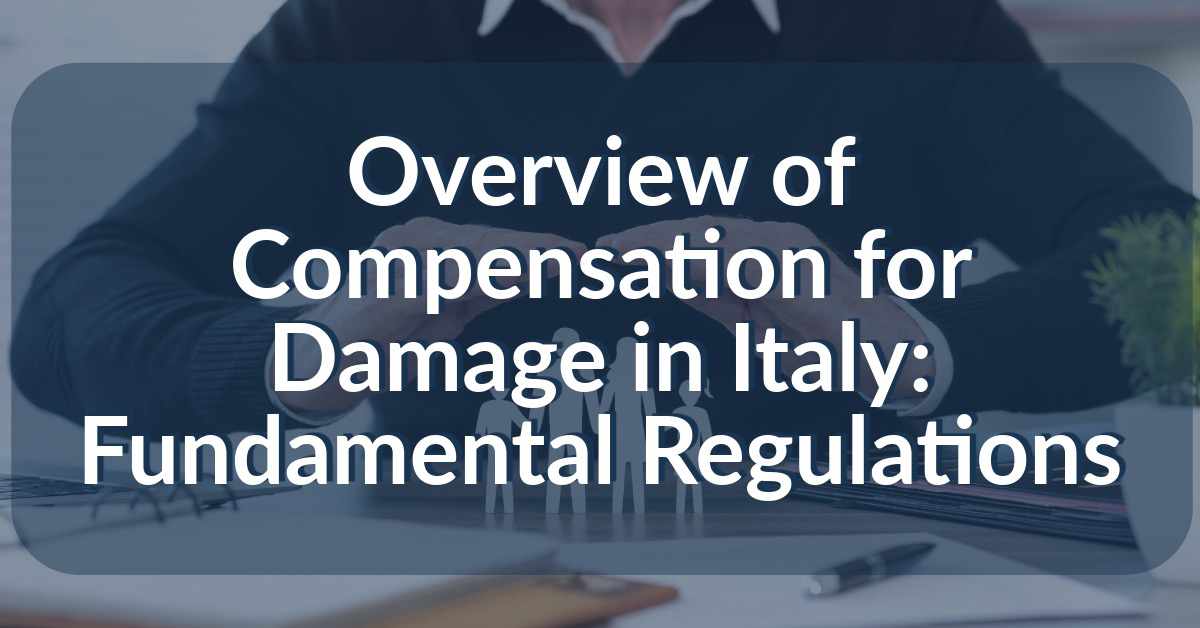Overview of Compensation for Damage in Italy: Fundamental Regulations
If you are a foreigner who has suffered damage in Italy and you do not know what the law provides for obtaining compensation for damage in Italy, you are in the right place. In this guide, we will provide you with an overview of the most relevant aspects concerning compensation for damage in Italy.
Introduction to Compensation for Damage in Italy
The regulation of compensation for damage to foreigners in the case of violation of fundamental human rights today provides that the condition of reciprocity, established by Article 16 of the Preliminary Provisions, does not apply when there is a violation of inviolable human rights, such as life and physical integrity.
The issue arose because the right to compensation for damage is a credit right, subject to prescription and not in itself among the inviolable rights of man. It should be included among the “civil rights” of Art. 16 of the Preliminary Provisions, which states that “the foreigner is admitted to enjoy the civil rights attributable to the citizen on condition of reciprocity and subject to the provisions contained in special laws.” However, this would recognize only a formal protection of the violated right for the foreigner, a minimal protection. This is why, after constitutionally oriented analysis, Italian jurisprudence has affirmed that the condition of reciprocity does not apply when inviolable rights of man, such as life, physical integrity, and the parental relationship, are violated.
Therefore, if a foreign citizen (legally residing in Italy, irregular, or even living abroad) or a relative asks for compensation for damage from the violation of fundamental human rights in Italy, the condition of reciprocity does not operate, as discrimination is not admissible.
Who We Are
We are an Italian law firm focused on assisting international clients with legal matters governed by Italian law. We provide strategic legal guidance, clear communication, and professional representation in cross-border cases. Learn more about us.
By proceeding, you confirm that you have read and agree to our privacy policy.
Many actions are recognized to obtain compensation for damage in Italy (some of which we will describe in the following paragraphs); not only the general action for liability under article 2043 of the civil code but also the action for joint liability towards the owner and the driver of the vehicle provided by article 2054 of the civil code, the direct action against the insurance company, and the action towards the Guarantee Fund for victims of the road.
What is Compensation for Damage in Italy and How is it Regulated?
Compensation for damage is compensation in favor of a subject who has suffered unjust damage resulting from an illicit act. The normative reference point in the Italian legal system is represented by article 2043 of the civil code, which states: “Any deliberate or negligent act that causes unjust damage to another obliges the person who committed the act to compensate the damage.” Unjust damage refers to the injury of a subjective legal situation protected by Italian law (a subjective right like the right of property / the right of credit or a legitimate interest when it comes to relations with the Public Administration).
The injured party can assert the injustice whenever it derives from conduct contrary to the law.
The compensable damage may concretely derive from:
- an extra-contractual illicit conduct, i.e., an injury to the coexistence among members of a community (“civil liability”)
- a contractual illicit conduct, i.e., an illicit behavior that violates certain contractual obligations.
What is important for compensation is that there is a causal link (article 1223 of the civil code) between the illicit conduct and the consequences caused (“consequence damage”). This means that compensation is allowed only for damages that are the immediate and direct consequence of the wrongdoing.
How is Compensation for Damage Obtained in Italy?
The damage caused by an event contrary to the rules of law implies a diminution of the victim’s assets or a modification of the material reality.
For this reason, to obtain compensation for damage in Italy, it is necessary to prove the damage and quantify it economically.
It is required to provide:
- proof of fault of the subject who caused it
- demonstration of the causal link between the causative conduct of the damage and the harmful event that occurred.
Only at a later stage can one proceed to economically quantify the damages against the responsible party (or, if applicable, the insurance covering civil liability).
What Types of Damage are Compensable in Italy?
The damage and, therefore, the compensation can be of two types:
- pecuniary damage: it is damage that has repercussions in the economic and work sphere of the injured party. In turn, it is divided into: emerging damage (decrease in assets) and loss of profit (lost earnings / loss of chances).
- non-pecuniary damage: it is damage that occurs when constitutionally guaranteed rights are violated on the occasion of an illicit act. More frequent cases in practice are injuries from road accidents or injuries caused by medical civil liability. Other examples are cases where a subject’s reputation and privacy are violated (defamation through the press, etc.).
When is Pecuniary Damage Compensated in Italy?
Let’s see the most frequent cases:
- when the injurious event has compromised the working capacity of the injured party
- in case of a reduction in work and income capacity following the assessment of physical injuries resulting from a road accident
- for damage to things, damage, theft, or destruction of goods and objects
When is Non-Pecuniary Damage Compensated in Italy?
In all cases where there is damage to the person’s health, therefore:
- for biological damage
- for moral damage
- for existential damage
These are cases in which there is an injury to the psychophysical integrity of the subject (suffering or compromise of their fulfilling activities in life).
It is a typical damage, because, as provided by article 2059 of the civil code, it is compensated only in cases established by law:
- if it originates from an illicit act, i.e., from a crime
- if a constitutionally guaranteed right of the person is violated
- in all other cases provided by law.
How to Calculate Damages Compensation in Italy?
It depends on a case-by-case basis. All components of the damage, both pecuniary and non-pecuniary, must be taken into account.
For example, the calculation for the compensation of pecuniary damages is based on documentary evidence (e.g., a purchase invoice for a stolen/destroyed object or a contract).
When it comes to impairment of working capacity, the income of the injured party should be multiplied by the capitalization coefficient and the confirmed biological damage (the formula: income of the injured party x capitalization coefficient x permanent disability = pecuniary damage).
For serious injuries, the calculation must be carried out following the assessment of physical injuries according to the coefficients provided in some reference tables (Milan Table for Major Injuries, updated annually). A Single Reference Table is expected to be introduced in Italy shortly.
Differences Between Contractual and Extra-Contractual (Tort) Liability
Generally, extra-contractual liability in Italy, also known as “tortious liability,” refers to damages caused outside of a pre-existing obligatory relationship between the parties. This involves the violation of the principle of neminem ledere, which imposes the duty to behave in such a way as not to harm other individuals.
Contractual liability in Italy, on the other hand, sees civil liability extending to damages resulting from the non-fulfillment of an obligation.
The distinction between these two types of liability is important both for the different burden of proof and for the statute of limitations (i.e., the period within which compensation can be requested).
Damage for Contractual Liability in Italy
In this case, there is a violation of a mandatory bond (even non-contractual). The contract represents only one of the sources of obligation. Others are provided in article 1173 of the civil code (unlawful act or any other act or event suitable according to the legal system).
The source of this type of liability is in article 1218 of the civil code, which gives the parties’ will in the contract the force of law. Consequently, when the debtor does not exactly perform the due service, they are liable for compensation for the damage, except for exceptions (e.g., non-fulfillment or delay resulting from a cause not attributable to them).
Compensation must be requested within 10 years (peremptory term), otherwise, the right expires.
It will be up to the debtor to demonstrate, if necessary, that the damage occurred due to a cause not attributable to them.
Damage for Extra-Contractual Liability in Italy
In this case, the liability derives from an unlawful act and is based on the principle of “neminem ledere” (article 2043 of the civil code).
Anyone who causes unjust damage to others is obliged to compensate for it, regardless of intent (malice and negligence are only relevant in criminal law).
The injustice of the damage is understood in a dual sense: as damage contra ius (harming a protected position or interest) and as damage non iure (in the absence of justifying causes).
The statute of limitations for claiming damage compensation is 5 years.
The injured party will have the burden of proving the fault of the one who caused the damage.
What Happens for Road Accident Damages in Italy?
For road traffic damages in Italy, there is a concurrence between contractual and extra-contractual liability.
The investor, in fact, is liable for compensation for damage from a crime for negligent injuries (if there are injuries) or for vehicular manslaughter, and, moreover, the RCA insurance based on the insurance contract that guarantees civil liability from road traffic must be considered.
The statute of limitations within which to claim damages is short (2 years, article 2947 of the civil code).
Insurance in Case of Road Accidents in Italy
In Italy, RCA insurance is mandatory on all approved vehicles that can circulate and guarantees civil liability in case of road accidents.
In these cases, there is a presumption of shared fault among those involved according to the rule dictated by article 2054 of the civil code.
If the CID (friendly accident statement) is filled out or there is an acknowledgment of guilt, the insurance pays all material and physical damages, following the relevant assessment.
However, the CID cannot always be filled out; we refer to cases of pedestrian accident, bicycle accident, accident to a transported passenger, accident with injuries of not minor entity. In the latter case, it will be necessary to forward the request for damage compensation according to the dictates of article 148 of the Code of Private Insurance, necessarily availing of the assistance of a lawyer specialized in the matter.
Compensation for Damages from Crime in Italy
Even in the criminal field, there is an obligation for the culprit to compensate for the damages resulting from the commission of a criminal offense (article 185 of the penal code).
Compared to article 2043 of the civil code, the obligation to compensate will only arise when the crime is ascertained. This type of damage also implies the recognition of moral damage.
Even in these cases, it is essential to rely on a civil lawyer for the compensation of damages.
Conclusions
We hope to have provided a comprehensive overview of damage compensation in Italy. If you need further clarification and assistance, you can contact one of our lawyers specialized in civil liability.
Dott.ssa Elena Capodacqua
What we do
Explore our legal services for international clients under Italian law.
Start Here
Essential guides for international clients dealing with Italian law.





